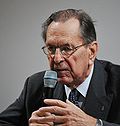United Nations Secretary-General selection, 1971
|
|
|||||||||||||||||||||||||
|---|---|---|---|---|---|---|---|---|---|---|---|---|---|---|---|---|---|---|---|---|---|---|---|---|---|
|
|||||||||||||||||||||||||
|
|||||||||||||||||||||||||
|
|||||||||||||||||||||||||
A United Nations Secretary-General selection was held in 1971 to replace U Thant. Three candidates received the 9 votes required in the Security Council to be selected Secretary-General: Carlos Ortiz de Rozas of Argentina, Kurt Waldheim of Austria, and Max Jakobson of Finland. However, all of the frontrunners were vetoed in the first two rounds of voting. In the third round, Waldheim accidentally escaped a triple-veto when three permanent members failed to coordinate their votes and all abstained. As a result, Kurt Waldheim was selected Secretary-General of the United Nations for a term starting 1 January 1972.
The Secretary-General of the United Nations is appointed by the General Assembly on the recommendation of the Security Council. Candidates for the office can be vetoed by any of the five permanent members. Members of NATO and the Warsaw Pact were not eligible for the job, as they would be vetoed by the opposing superpower. Only diplomats from neutral countries could expect to escape a veto.
On 18 January 1971, Secretary-General U Thant announced that he would not seek another term. Thant had been serving as Secretary-General since 1961, when his predecessor Dag Hammarskjöld died in a plane crash. The Soviet Union, France, and Third World countries wanted to draft Thant for at least one more year in office, as he had been strongly opposed to apartheid and colonialism. However, Thant declared that his decision was "final and categorical," and he would not serve "even for two months" past the end of his term. The United States also opposed another term for Thant, citing his administrative shortcomings and his opposition to the Vietnam War.
Max Jakobson of Finland entered the race on 20 January 1971. Jakobson had taken a strongly anti-colonial stance, winning him the support of the newly-independent countries of Africa. He was supported by the United States and the United Kingdom, while France was troubled only by his inability to speak French. Jakobson had been praised privately by Arab diplomats for his fairness in chairing a committee on Palestinian refugees. However, the Arab countries and the Soviet Union expressed their belief that he would be subject to Zionist pressure because of his Jewish ancestry. Western diplomats believed that the Soviet Union actually opposed Jakobson because of his views on Finnish-Soviet relations, but Soviet diplomat Victor Israelyan revealed decades later that the Soviet Union vetoed Jakobson on behalf of the Arabs.
...
Wikipedia


